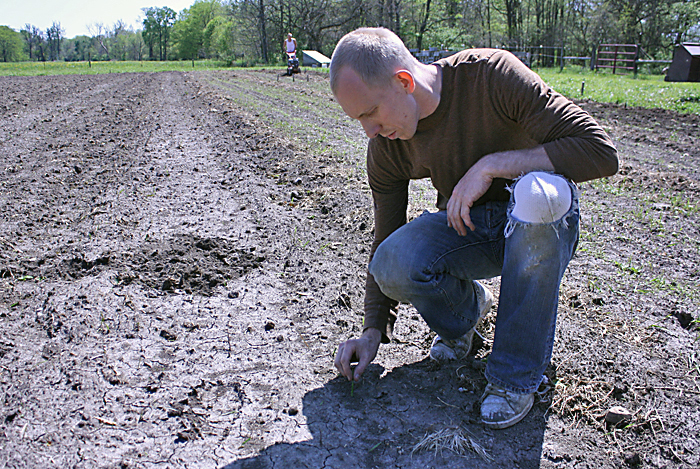- Ken Myszka,
CEO and executive chef of Station 220
 |
Ken Myszka inspects an onion plant at the family farm in Downs, Ill. to see if it has been damaged by a frost that hit the area a few nights previously. (Photo by George Jett / Staff Photographer) |
In today’s hamburger-and-fries culture, grease and salt smother many of the menu items in local restaurants. While some establishments are content to serve such food, others are now focusing on healthier options for their customers.
Ken Myszka, CEO and executive chef of Station 220 in Bloomington, has cooked up a plan to deliver fresh produce from the farm to your fork at a pace that gives a whole new meaning to the term “fast food”.
“It takes about eight minutes to get the food from the farm to the restaurant, 25 minutes depending on which farm it is coming from,” says Ken. “We harvest and deliver three times a week.”
Ken and his two partners, Stu Hummel and Nanam Yoon Myszka, took over Station 220 one year ago. It was the fulfillment of a long-held dream for the New York trained chef, a plan prompted by a casual trip to a farmers’ market.
“I was going to culinary school at the time, it was spring break and I was going home to Downs, Ill.,” he remembers. “This was when I went to my first farmers’ market. I met these two farmers and we got talking. They took me on a tour of their land, and let me actually pick peaches and pull up carrots and potatoes with my own hands. That was when I had my ah-ha moment – I realized then that I loved fresh food and wanted to try farming.”
Ken says that even the soil in which the crop is grown has a vital influence on the taste and quality of the final dish. “If the soil is lacking in nutrients the food it produces will lack them as well. In short, a healthier soil means a healthier you.”
Inspired by his visit to the local farmers market, Myszka moved to Las Vegas for additional schooling. He was determined to revolutionize the restaurant business by making his own farm-fresh foods at the quality of the high end restaurants he was working at in Las Vegas.
Myszka gave himself a three-year window to hone his skills and find a suitable spot for an establishment. Just before he and his partners were about to sign on a twelve-table restaurant in Bloomington, they were offered a partnership for Station 220.
“It was the perfect location and a much larger opportunity for us” he says.
The team is now fully established in the 110-year-old historical building – once a Bloomington fire station – with produce coming from Epiphany Farms just south of Bloomington, as well as from farmland in Downs and Ellsworth, Ill.
As with any business venture, there have been obstacles. Farming organically can be more expensive than ordering food through the conventional system. The farm’s efficiency was not the best, which made getting the restaurant going more challenging.
“It’s been difficult at times but things have improved tremendously. The first year of farming we only produced 50 chickens, but, in year three we produced 650 chickens,” Myszka says.
Thanks to remarkable improvements, Epiphany Farms now produces 350 different vegetables, a large assortment of herbs, grass-fed beef, cage-free chickens, pigs, turkeys, ducks, hens, and eggs for Station 220. Moreover, the restaurant is now able to produce its own honey and maple syrup. The menu is updated seasonally to ensure fresh picked foods at all times.
However, there is more to Station 220 than its farm-fresh menu. Live music is performed on Friday evenings to create a pleasant environment while enjoying your meal. In addition, a newly renovated space above Station 220, known as “The Loft,” is a lounge/nightclub commonly used as a sophisticated socializing space.
While Myszka hopes one day to add future restaurants in Chicago and New York, he says his focus remains firmly on nurturing the reputation of Station 220.
“We want to be voted the best restaurant in the Midwest,” he says. “We want to be a place our community can be proud of. We want to be the best restaurant in the world.”